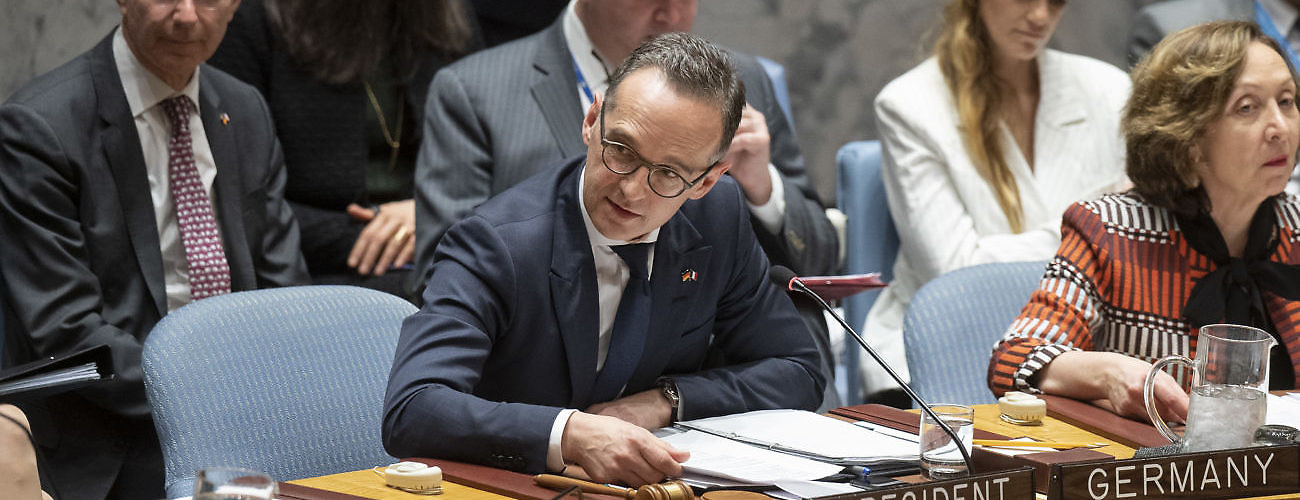Heiko Maas, the Minister for Foreign Affairs of Germany, chairing the April 1 Security Council meeting focusing on international humanitarian law. (UN Photo/Eskinder Debebe)
On April 1, Germany began its presidency of the United Nations Security Council, entering the second month of what France and Germany have presented as a joint presidency. Back-to-back events on that day made a forceful statement on the importance of strengthening respect for international humanitarian law (IHL) and humanitarian principles, and provided an opportunity to launch a “Humanitarian Call for Action.” As stressed by many during these events, the time for action and implementation is now, if not yesterday. German Minister of Foreign Affairs Heiko Maas closed the meetings by noting that they “mark a start,” which begs the question, what next?
These meetings were an opportunity for humanitarian actors to, once again, raise the alarm bells. “The noose is tightening on humanitarian action,” said Peter Maurer, president of the International Committee of the Red Cross. The topics at hand were the broad and complex themes of protecting medical and humanitarian personnel and safeguarding humanitarian space. The end result is that member states, UN agencies, and humanitarian groups discussed a wide array of issues.
On the protection of humanitarian and medical personnel, member states made the oft-repeated calls for better data collection on attacks, more systematic independent and impartial investigations, and the need to fight impunity. Humanitarian organizations highlighted threats to their work, providing recommendations to better protect the space for conducting principled humanitarian activities. In the afternoon, there was much discussion of the need for better IHL implementation and compliance, and several representatives addressed the role of states that partner in or support armed operations in influencing the behavior of their partners. The importance of IHL training and dissemination was also noted, in particular with state armed forces, but also with non-state actors.
Of note, and a new development in such discussions, were the relatively numerous mentions of the need to balance counterterrorism efforts with IHL considerations, and to carve out a space for principled humanitarian action in counterterrorism measures and sanctions regimes. One of the briefers, Professor Naz Modirzadeh of Harvard Law School, was specifically invited to discuss the interaction between counterterrorism and IHL frameworks, and to discuss the adverse effects counterterrorism measures can have on principled humanitarian action. This has been an area of increasing concern for humanitarian actors, and there is a growing body of research outlining these effects.
The briefing in the afternoon came right on the heels of tough negotiations for the French-led Security Council resolution 2462 on strengthening measures to counter the financing of terrorism, adopted on March 28, where the issue of incorporating safeguards for humanitarian activities as foreseen by IHL was at the crux of the tensions. The strong mobilization by humanitarian actors, concerned that the resolution may broadly criminalize humanitarian activities, helped ensure that, for the first time in a Chapter VII resolution on counterterrorism, language providing some safeguards for humanitarian activities was included.
With its upcoming Security Council sessions on IHL and humanitarian action, France also likely felt the pressure to stand strong on IHL, even in the context of negotiating a counterterrorism resolution, where IHL language has in the past been mostly weak and relegated to the preliminary paragraphs of resolutions. The safeguards in resolution 2462 are not as strong as some humanitarian organizations might have wished for, however, and much will depend on how states translate them into their national legislation. Here, states have the opportunity to turn their commitment to IHL, highlighted in numerous statements during the events, into concrete action.
Where To From Here?
David Miliband, president of the International Rescue Committee, asked for “action not words,” adding that “we have had resolutions, now we need resolution.” The launch by France and Germany of a “Humanitarian Call for Action,” described as an international mobilization, may be a signal of such resolution to strengthen respect for IHL and to safeguard the humanitarian space. The goal of this call is to draw up concrete measures and recommendations in the coming months to extend the scope for action of humanitarian aid workers by strengthening the law, with the stated hope that it will lead to the adoption of a declaration of engagement by states.
A number of countries joined France and Germany’s call, but the exact shape and form the initiative will take is of yet unclear. This is the second such initiative that France has promoted. In October 2017, they convened a ministerial meeting on the protection of humanitarian and medical personnel, where member states were invited to sign a political declaration agreeing to the implementation of a series of concrete measures. To date, thirty-nine countries have signed on.
While these sorts of high profile efforts have value—if only to bring certain issues to light and perhaps exert some soft pressure on states—what humanitarian organizations and the people they are there to help are waiting for is concrete change on the ground. On April 1, the calls for implementation of IHL obligations were replete. Humanitarian organizations and some member states made concrete and practical recommendations that could be taken forward. Some member states shared examples of positive efforts undertaken at the national level that can inspire others.
While attacks on healthcare continue unabated and the humanitarian space is increasingly challenged, in the Security Council—where these trends can begin to be counteracted—the rubber often hits the road when discussions go beyond broad declarations of commitment to IHL. In the meantime, humanitarian actors must continue to advocate for their space, while we wait for the political will to be mustered for action, not just words.





